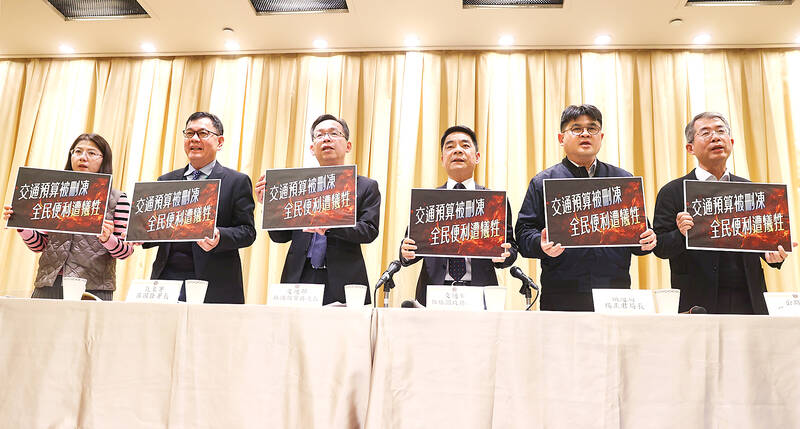Budget cuts would greatly hinder the Central Weather Administration’s (CWA) ability to provide daily weather forecasts and undermine the Highway Bureau’s efforts to boost the use of public transportation, the Ministry of Transportation and Communications said yesterday.
The legislature has eliminated about NT$610 million (US$18.6 million) from the ministry’s budget and frozen another NT$11.7 billion.
A large percentage of the eliminated budget would have been used to invest in new transportation facilities and upgrading existing ones, the ministry said.

Photo: CNA
About NT$6.86 billion of the Highway Bureau’s budget has been frozen by lawmakers, the highest amount among all agencies under the ministry, it said.
The frozen funds include NT$2 billion that was allocated to improve highways and vehicle management systems, and NT$4.86 billion to build and maintain highways.
The legilsature also froze NT$7.47 billion and NT$3.37 billion from the Tourism Administration’s and CWA’s budgets respectively, it said.
The ministry could only access the frozen funding after securing the legislature’s approval.
“However, the opposition parties have set stringent criteria to unfreeze the funding. Failure to release the funds would make it difficult for the ministry to implement policies as planned,” it said in a statement.
The ministry held a news conference in Taipei yesterday to show how agencies would be affected by the slashed budget.
“In the past few years, we have built many stations to observe and forecast severe weather. We halso use a supercomputer to provide more accurate weather forecasts. We are planning to incorporate artificial intelligence in our forecasts for severe weather. The budget cut, which reduces funding for utility fees, equipment maintenance fees and other key expenses at the CWA, would prevent the supercomputer from being able to offer data instantly and would compromise the data quality,” CWA Administrator Lu Kuo-chen (呂國臣) said.
The CWA said that the budget cut would also create obstacles for its plan to build new facilities to accommodate servers for the supercomputer in the weather station in Hsinchu County, adding that its plan to build seventh, eighth and ninth-generation supercomputers would have to be postponed.
The agency had planned to lay an undersea cable in the waters south of Taiwan to detect earthquakes, but the budget cut would impede its construction and even compromise the maintenance of existing cables, it said.
The cut would also affect the regular maintenance of 700 weather and earthquake observation stations nationwide, it added.
In addition to the NT$6.86 billion frozen by the legislature, the Highway Bureau’s budget was cut by NT$2.65 billion.
The bureau would no longer be able to subsidize city or freeway buses, which could prompt bus operators to cancel some unprofitable lines, Highway Bureau Director-General Chen Wen-jui (陳文瑞) said.
The reduced funding for utilities would compromise service quality at motor vehicle offices nationwide, Chen said.
The bureau would also be left without extra funding to improve the designs of bottlenecks at certain highway sections and maintain 5,300km of highways and expressways, he said.

An essay competition jointly organized by a local writing society and a publisher affiliated with the Chinese Communist Party (CCP) might have contravened the Act Governing Relations Between the People of the Taiwan Area and the Mainland Area (臺灣地區與大陸地區人民關係條例), the Mainland Affairs Council (MAC) said on Thursday. “In this case, the partner organization is clearly an agency under the CCP’s Fujian Provincial Committee,” MAC Deputy Minister and spokesperson Liang Wen-chieh (梁文傑) said at a news briefing in Taipei. “It also involves bringing Taiwanese students to China with all-expenses-paid arrangements to attend award ceremonies and camps,” Liang said. Those two “characteristics” are typically sufficient

A magnitude 5.9 earthquake that struck about 33km off the coast of Hualien City was the "main shock" in a series of quakes in the area, with aftershocks expected over the next three days, the Central Weather Administration (CWA) said yesterday. Prior to the magnitude 5.9 quake shaking most of Taiwan at 6:53pm yesterday, six other earthquakes stronger than a magnitude of 4, starting with a magnitude 5.5 quake at 6:09pm, occurred in the area. CWA Seismological Center Director Wu Chien-fu (吳健富) confirmed that the quakes were all part of the same series and that the magnitude 5.5 temblor was

The brilliant blue waters, thick foliage and bucolic atmosphere on this seemingly idyllic archipelago deep in the Pacific Ocean belie the key role it now plays in a titanic geopolitical struggle. Palau is again on the front line as China, and the US and its allies prepare their forces in an intensifying contest for control over the Asia-Pacific region. The democratic nation of just 17,000 people hosts US-controlled airstrips and soon-to-be-completed radar installations that the US military describes as “critical” to monitoring vast swathes of water and airspace. It is also a key piece of the second island chain, a string of

The Central Weather Administration has issued a heat alert for southeastern Taiwan, warning of temperatures as high as 36°C today, while alerting some coastal areas of strong winds later in the day. Kaohsiung’s Neimen District (內門) and Pingtung County’s Neipu Township (內埔) are under an orange heat alert, which warns of temperatures as high as 36°C for three consecutive days, the CWA said, citing southwest winds. The heat would also extend to Tainan’s Nansi (楠西) and Yujing (玉井) districts, as well as Pingtung’s Gaoshu (高樹), Yanpu (鹽埔) and Majia (瑪家) townships, it said, forecasting highs of up to 36°C in those areas